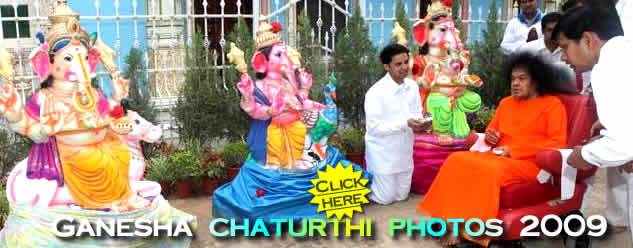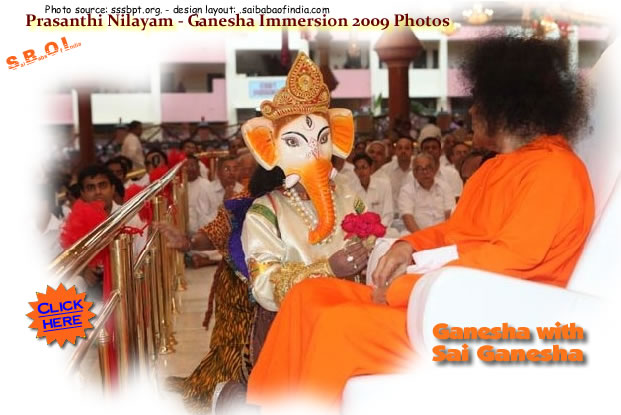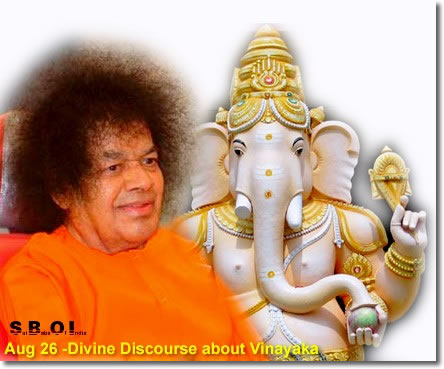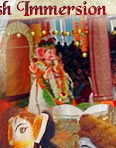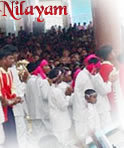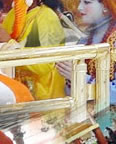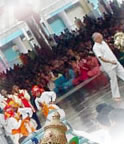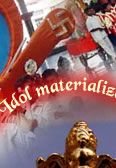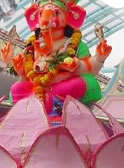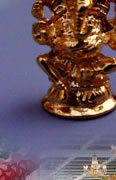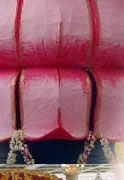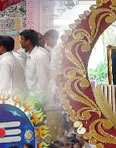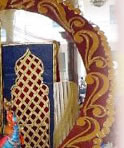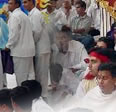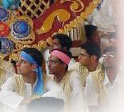|
Vinayaka Chaturthi day
It is a wonderful fact that devotees of Bhagawan Baba who belong to religions
other than Hinduism have cheerfully accepted Lord Ganesha as a Deity who ought
to be worshipped and propitiated, especially before the commencement of any
auspicious function. One can see any number of examples of this in Prasanthi
Nilayam. On Christmas Eve, there is invariably a Carol singing program, but
the first song is always about Ganesha.Devotees coming from Iran occasionally
get the blessing of singing Bhajans before Swami. Their Bhajans are
understandably mostly about Allah; nevertheless, the first song is always
about Ganesha.So it is with Chinese, Japanese, Russians and so on, who sing
Bhajans here. In addition I have seen many, many times, Russians, Mexicans,
and so on go around the Ganesha idol near the front gate here in Prasanthi
Nilayam.
What is the significance of all this? Who is this Ganesha and why is He so
important? One can give a detailed explanation as to who exactly Ganesha is,
in terms of folklore, but I shall not do that. Instead I shall refer to
something Swami often mentions. He reminds us that Ganesha is VINAYAKA.
Vinayaka= Vi + Nayaka. Nayaka means Leader, and Vinayaka means one who has no
leader above him. Who is that? God, of course! Hence, when one worships
Vinayaka, it simply means that one is worshipping God.
Fine, in that case, why did not ancient Indians simply say, "Listen, before
you do anything, think of God and pray to Him."? Why did they make a big issue
of asking that prayers be especially addressed to "an Elephant God"? Ah, all
that is a matter of psychology! Humans are generally like sheep; they follow
very well something drilled into them [but mostly fail to follow something
that is explained with logic, argument and so forth]. Knowing this, ancient
Indians said, "You shall worship Vinayaka before you start any good work. He
will confer His Grace and make your activity fruitful." Needless to say that
in order to convey the idea that Ganesha is someone very special, a unique
form was given to Him and various explanations too about the significance of
this particular form. There is no need for me to repeat all this, since Baba
has touched upon them any number of times in His Discourses. But the bottom
line is: Vinayaka simply means God. And pray to God we all must, whenever we
start any auspicious activity. That is the reason why Swami stresses on the
worship of Vinayaka; in other words, he is simply administering a dose of the
good old medicine.'
I shall wind up with an anecdote, an experience of mine, if I might say so.
Many years ago I was one morning, waiting in the Mandir to make a small prayer
about something to Swami and get His approval. I don't remember what it was,
but that does not matter. Swami had gone in for the morning session of the
Interviews, and I waited near His door on the upper veranda. After the
Interview was over, Swami came out and when all devotees trooped out of the
room, He wiped His forehead and went to the lower veranda to talk to someone
there. After about a minute or so, he came back saying, "No Buddhi!" ("No
Intelligence!") He then saw me and said, "You too; no Buddhi!" I smiled and
replied, "Yes Bhagavan, that's sadly true. So, please give me Buddhi and along
with it, also Siddhi [Purity]."Siddhi and Buddhi, some of you may know, are
the two things one prays to Ganesha for, sine He is supposed to be the
custodian of these two treasures. Swami looked at me and said, "Buddhi and
Siddhi? Why ask me? Ask Ganesha. See, I don't have any trunk!" so saying,
swami curled His arm to make it look like a trunk. I wouldn't give in, and
replied, "But, Swami, are You not Vinayaka?" Swami smiled and did not say
anything; in a matter of speaking, I had the last word!
Source:
http://www.radiosai.org/Journals/01AUG31/Blossoms/Reflections.htm
**********
Sathya Sai Baba: Who is Vinayaka? In the sloka (verse) beginning with the
words, Suklaambaradharam Vishnum, only the form of the deity is described. But
there is another inner meaning for the name Vinayaka. Suklaambaradharam means
one who is clad in white. Vishnum means he is all-pervading. Sasivarnam means
his complexion is grey like that of ash. Chathurbhujam means he has four arms.
Prasannavadanam means he has always a pleasing mien. Sarvavighnopasaanthaye
means for the removal of all obstacles. Dhyaayeth, meditate (on him). Vinayaka
is the deity who removes all bad qualities, instills good qualities and
confers peace on the devotee who meditates on him.
Sathya Sai Baba: Another name for Vinayaka is “Vighneswara.” Easwara is one
who is endowed with every conceivable form of wealth: riches, knowledge,
health, bliss, beauty, etc. Vighneswara is thepromoter of all these forms of
wealth and removes all obstacles to their enjoyment. He confersall these forms
of wealth on those who worship him. Vinayaka is described as “Prathama
Vandana” (the first deity who should be worshipped). As everyone in the world
desires wealth and prosperity, everyone offers the first place for worship to
Vigneswara.
***********
Ganesha Chaturthi or Ganesha Festival is a day on which Lord Ganesha, the son
of Shiva and Parvati, is believed to bestow his presence on earth for all his
devotees. It is also known as Vinayaka Chaturthi or Vinayaka Chavithi in
Sanskrit, Kannada, Tamil and Telugu, Chavath in Konkani and as Chathaa in
Nepal Bhasa. It is celebrated as it is the birthday of Lord Ganesha. The
festival is observed in the Hindu calendar month of Bhaadrapada, starting on
the shukla chaturthi (fourth day of the waxing moon period). Typically, the
day falls sometime between 20 August and 15 September. The festival lasts for
10 days, ending on Ananta Chaturdashi. This festival is observed in the lunar
month of bhadrapada shukla paksha chathurthi madhyahana vyapini purvaviddha.
if chaturthi prevails on both days, the first day should be taken. Even if
chaturthi prevails for complete duration of madhyahana on the second day, but
if it prevails on previous day’s madhyahana period even for one ghatika (24
minutes) the previous day should be taken. (Ref. Dharmasindhu and Indian
Calendric System, by Commodore S.K. Chatterjee (Retd). Madhyahana is the 3rd /
5th part of the day (Sunrise-sunset). Ganesha, the elephant-headed son of
Shiva and Parvati, is widely worshipped as the supreme god of wisdom,
prosperity and good fortune. While celebrated all over India, it is most
elaborate in Maharashtra, Goa (Biggest festival for Konkani people all over
the world) Gujarat, Karnataka and Andhra Pradesh, and other areas which were
former states of the Maratha Empire. Outside India, it is celebrated by Newars
in Nepal
Source:
http://en.wikipedia.org/wiki/Ganesh_Chaturthi
***
Ganesh Chaturthi, Ganesh Chaturthi 2009, Ganesh Chaturthi Greetings, Ganesh
Chaturthi Messages, Ganesh Chaturthi Pictures, Ganesh Chaturthi Puja, Ganesha
Chaturthi, Ganesha Chaturthi 2009, Ganesha Festival, Vinayaka
Chaturthi,Celebration, Chaturthi, Festival, Ganesh, Ganesha, Greetings, Hindu,
Hinduism, Holiday, India, Puja, sathya sai baba, Vinayaka, 2010
,2011,2012,2013,2014,2015,2016,2017,2018,2019,2020...
|

